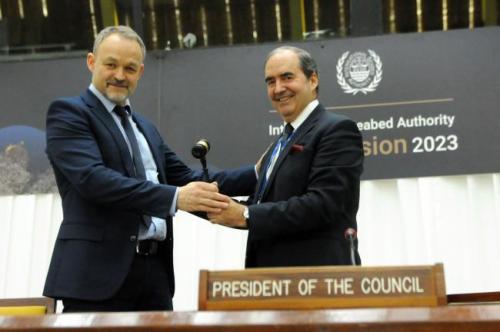
https://enb.iisd.org/international-seabed-authority-isa-council-28-2-13j...
“Do we know enough to reliably predict the environmental impacts of deep-sea mining?” This remark from an observer highlighted the underlying question facing delegates during the morning's discussions, which focused on environmental protection. A delegate was quick to draw the full picture of the day’s deliberations: “And once we figure it out, we need to ensure inspection, compliance, and enforcement (ICE) of all our environmental safeguards.”
Facilitator Raijeli Taga (Fiji) opened the last session of the Working Group on the protection and preservation of the marine environment, inviting Council members to focus on environmental impact assessments (EIAs) (regulation 47bis), delegates expressed different views on whether to include reference to “general international law.” Many delegations highlighted consultations between the sponsoring state and the contractor and coastal states with respect to resource deposits in the Area which lie across limits of national jurisdiction, should be open to all coastal states, not just "affected" ones. A delegate suggested including a provision on assessment of the impacts on human health.
Raijeli Taga, Fiji, Facilitator of the Working Group on the protection and preservation of the marine environment
On the EIA scoping report (regulation 47ter), a member suggested minimizing the consultation process, while another proposed specifying the extent and time frame for such consultation. A delegate suggested that the final version of the scoping report should be available on the ISA’s website to provide transparency. Another delegation noted that guidelines are recommendatory in nature. Some Council members requested deleting references to underwater cultural heritage, while others suggested further discussions.
On the environmental impact statement (regulation 48), many delegates supported moving part of the regulation’s content to a standard. Some delegations noted that, if these provisions are moved to a standard, their core elements should be captured in the draft regulations and function as signposts for developing the standards. A regional group stressed that: the independent experts’ peer review of the environmental impact statement should not be mandatory since the Legal and Technical Commission (LTC) is the appropriate body to perform an independent review. Some members proposed including a stakeholder consultation process and “detailed” descriptions of various elements, such as the environmental setting, and spatial and temporal boundaries. A delegate suggested describing potential cumulative environmental effects, and unavoidable residual impacts and effects.
On a new EIA and a revised environmental impact statement (regulation 48bis), some delegates suggested prescribing a role for the Council, in addition for the LTC, in requesting new EIAs. A couple of delegates proposed referring to an “additional” or “revised” EIA rather than a “new” one.
Council members during Thursday’s proceedings
On test mining (regulation 48ter), Belgium presented the outcome of intersessional work, noting that test mining should be mandatory, comply with the highest environmental standards, and take place before an application for a plan of work. In the ensuing discussion, Council members, focused on, among other things:
- the need for a clear test mining definition:
- whether to require a standalone test mining report or include it in the EIA report;
- possible alternatives to in situ test mining; and
- whether test mining should be performed during the exploration or the exploitation phase,
An observer stressed that while test mining can provide substantial data, “its role is prognostic and its outcome open to interpretation.” Another observer stressed the need to take into account submarine cables. Others highlighted that test mining also has environmental impacts and should be subject to an EIA.
On mining closure plans (regulations 59-61), the Russian Federation, on behalf of Fiji, presented the outcome of intersessional work, highlighting areas of focus: post-closure monitoring and potential rehabilitation; procedural and financial issues; and definitions and terminology.
Facilitator Taga highlighted deliberations under the informal intersessional groups that allowed progress, encouraged further negotiations, and closed the meeting of the working group.













Add new comment